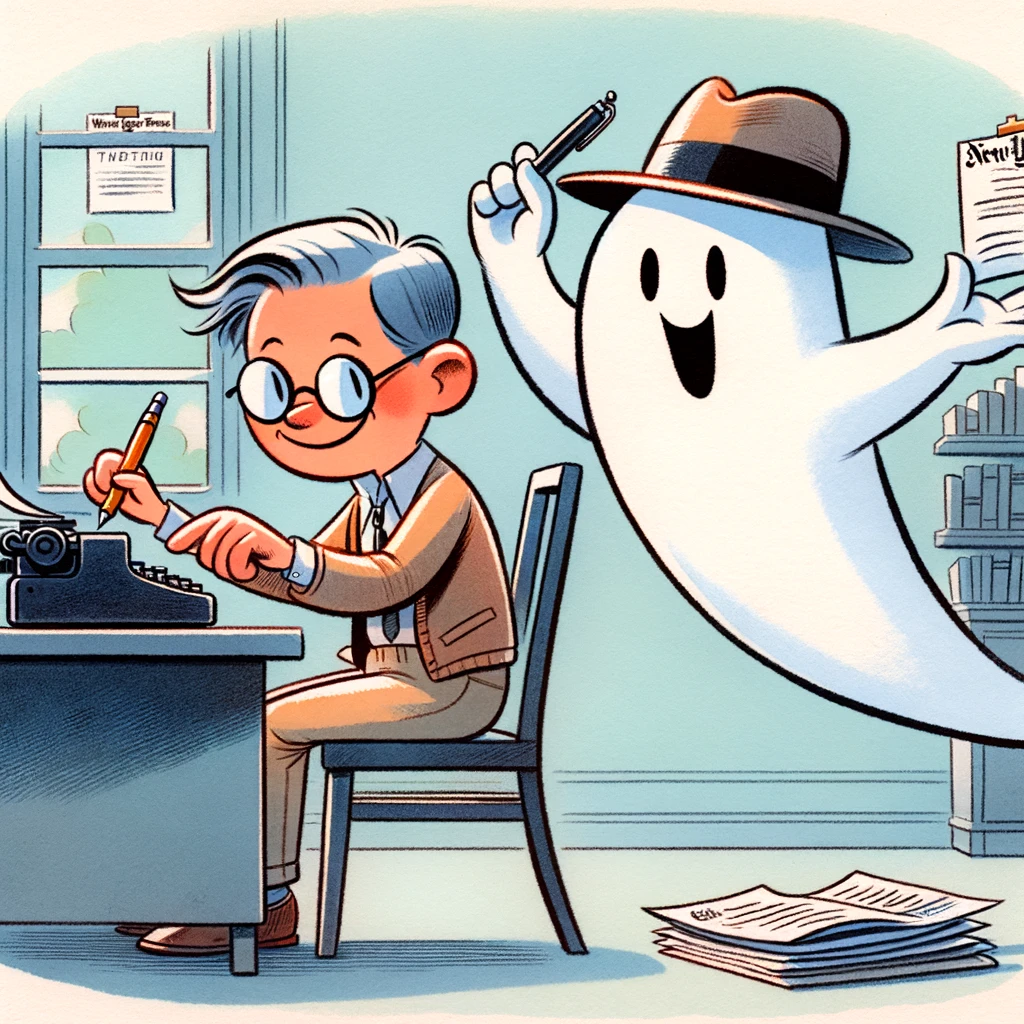We’re working on a few books this year and have fielded questions on how ghostwriting works.
Whether you need help finishing a book, want it to sound just like you, or are just curious about ghostwriting, this complete guide has you covered.
Ghostwriting definitions and limitations
What exactly is ghostwriting? How is a ghostwriter different from a co-writer, editor, or writing coach?
Ghostwriting is when someone writes your book for you, and you get the credit. It’s different from co-writing, where you and the writer share the credit.
Editing is when someone improves writing you’ve already done. A writing coach helps you write the book yourself, offering guidance and advice.
It’s important to know what you need. Sometimes a potential client thinks they just need an editor when really, they need ghostwriting services to help them write from the start.
Others might think they need a ghostwriter but really just want guidance to write their own book.
There are also different types of freelance writing professionals. For example, a memoir ghostwriter probably won’t specialize in academic ghostwriting jobs.
Similarly, a freelance writer might lean more toward blog content marketing and struggle with non fiction book writing.
To simplify things:
- If you just want help polishing your writing, get an editor.
- If you want guidance as you write, get a writing coach instead.
- If you want someone to write the book for you, hire a ghostwriter.
Can a ghostwriter help complete a manuscript that has been stalled for a long time?
If you’ve hit a wall with your manuscript, a quality ghostwriter can jump in and help get things moving again.
They’ll bring fresh eyes to your work and can offer new ideas or perspectives you might not have considered.
A common hiccup is when you’re too close to the project and can’t see what’s missing or what could be improved.
A skilled ghostwriter helps to bridge that gap, but you’ll need to be open to their suggestions to move past the standstill.
What qualifications should a ghostwriter have to write a biography or business book?
Good ghostwriting is less about formal education and more about the writer’s ability to extract and structure your story.
We’ve worked with expert ghostwriters who were previously journalists, teachers, coaches, consultants, and speakers.
Sometimes, people think any freelance writer can write their book, but it’s best when the writer knows about your world, whether it’s your life story or your business journey.
If you’re a business expert, your ghostwriter should ideally understand your industry’s business terms and ideas.
They should ask you the right questions to get the details they need to write your book.
How does a ghostwriter capture your voice in the writing?
To write in your voice, a skilled ghost learns how you talk and what matters to you. They listen to your stories and take notes.
Sometimes, writers might get it wrong at first, writing in a way that doesn’t sound like you. It’s a process of shaping their writing style until it matches yours.
As a client, you’ll need to read their work and tell them what sounds right and what doesn’t. They’ll rewrite parts until it feels like your voice is on the page.
Are there any genres or topics ghostwriters typically don’t work on?
Most ghostwriters are pretty flexible, but some might not write about certain topics, like highly technical subjects they’re not familiar with or genres they’re not comfortable with, like religion or erotica.
It’s best to be upfront about your book’s topic to match with a ghostwriter who’s a good fit.
Ghostwriting tools
What software tools are essential for managing a ghostwriting project?
Ghostwriting is less about software and more about processes and content creation. You might not handle any software, but it’s good to know how it helps.
Your ghost will use tools for organizing the project, such as:
- Word processors with comment and track changes features (we use Google Docs)
- Collaboration software to stay in touch and share ideas (we use email and Slack)
- Project management software to keep timelines in check (we use Asana)
You don’t need all the bells and whistles — just the ones that make writing and reviewing your book easier.
It’s important these tools work well because technical issues can lead to lost drafts or missed messages.
Regular check-ins and clear discussions can help prevent these issues. We recommend a once-monthly call between you and your ghost to align.
Is plagiarism detection software used in the ghostwriting process?
It’s important your book is all original. Plagiarism software checks that the words in your book aren’t the same as someone else’s.
A small mix-up could happen — like a common phrase getting flagged as plagiarism. Your professional writer should know how to fix any issues without changing your message.
Can’t I just use AI to write my book?
Using AI to write your book might seem like a quick and easy solution, but it has its limits.
AI can help with content creation based on what you feed it, but it doesn’t have personal experiences or emotions.
Your book isn’t just a collection of facts or stories. It’s your voice, experiences, and unique perspective. AI can’t capture that. Also, AI might miss the nuances of your story or get details wrong.
Nothing beats the personal touch and understanding a human ghostwriter brings to your project.
They’ll work with you to make sure your book feels real and genuine, something AI just can’t do yet.
Ghostwriting process
How does a ghostwriter structure the workflow of a new writing project?
Your ghostwriter will map out the whole project before starting. They’ll set up deadlines for each part of the book and check in with you to make sure everything’s on track.
This plan is flexible, though. Sometimes, things take longer than expected, or new ideas come up that you want to include.
The key is to keep communication open so you both know what’s happening and can adjust the plan as needed.
As a ghostwriting agency, we have templates and tools to lay out your book’s structure. These help organize everything from the main ideas to the details.
What are the standard frameworks or methods used in ghostwriting a non-fiction book?
When you’re writing a non-fiction book, it helps to have a clear plan. Ghostwriters usually start with an outline to put all your thoughts in order.
These could be the steps in your business’s success or the key moments in your life.
Your ghostwriter will pick a structure that fits your story, like in the order things happened or grouped by themes.
Sometimes, the first plan doesn’t cover everything, and you might need to add more details or change things around.
That’s normal — it’s part of making sure your book covers all the important points.
Confidentiality and legal considerations
How is client confidentiality maintained in the ghostwriting process?
Your stories and ideas are private, and a ghostwriter keeps it that way. They agree not to tell anyone anything not agreed, or that they wrote it.
If there are parts of your story that are sensitive or private, you can talk about how to handle them in the book.
It’s about finding a balance between being honest and protecting the privacy of you or others involved in your story.
What are the legal rights and obligations involved in a ghostwriting agreement?
In a ghostwriting agreement, you keep all the rights to your book, and the ghostwriter promises to keep your work private.
The agreement says what the ghostwriter will do, how much you’ll pay, and when the work should be done.
Sometimes, misunderstandings happen if the agreement isn’t clear. It’s important to read the ghostwriting contract carefully and make sure you agree on everything before the writing starts.
What’s the standard policy on credits and acknowledgments?
Typically, a ghostwriter doesn’t get credit for writing the book — that’s what makes them a ghost.
The client typically remains the sole credited author. But if you want to thank your ghost in the acknowledgments, that’s okay.
Some ghostwriters prefer to stay completely in the background, though, so talk about it and agree on what works for both of you.
How are disputes or disagreements resolved during the ghostwriting process?
If there’s a disagreement, the first step is to talk about it and try to find a solution that works for all parties.
Most problems on a ghostwriting job can be solved with good communication and compromise.
If you really can’t agree, refer back to your contract to see what it says about resolving disputes.
You might opt to get a mediator or arbitrator before getting lawyers involved.
The goal is to work things out in a fair and professional way.
Collaboration, alignment, and feedback
What kind of input and collaboration will be needed from me?
Your insights, feedback, and approval are crucial at every step.
Your ghostwriter might ask you to review parts of the book, give them more details on certain topics, or help them understand your perspective better.
It’s a team effort, so your active involvement is important. They shouldn’t overload you, but rather guide you on where and how you can provide the most helpful input.
How are research and interviews handled in the ghostwriting process?
For your book, your potential ghostwriter will need to gather lots of information. They’ll likely do interviews with you, where you can share your stories and insights.
They might also look into other sources or talk to other people to make sure they get all the facts right.
But it’s your story, so what you say is key. Sometimes, research can lead ghostwriting projects in different directions, so it’s important to regularly check that it’s all still aligned with your vision.
How do you resolve issues around alignment or creative differences?
Creative differences are part of the writing process. A professional ghostwriter will listen to your ideas and try to understand your vision for the book.
If there’s a difference in opinion, they’ll discuss it with you to reach a solution that honors your story while keeping the writing strong.
Sometimes, there’s a temptation to stick only to what you know, but a good ghostwriter can help you consider options that could enhance your book or memoir.
It’s a dance of give and take, with the goal of creating a book you’re proud of.
How does the feedback process work?
You’ll talk to your ghostwriter to give feedback, or leave comments in the drafts they send you. They’ll take your comments and make changes to the book.
Sometimes, what you say might not get through right away, and things might need a few tries before they’re just right.
Clear and direct feedback helps sort this out faster. It’s all about working together to refine and polish your story.
What happens if I’m not satisfied with the final manuscript?
If you’re not happy with the final draft, you and your ghostwriter can discuss what’s not working for you and make revisions.
If you both can’t get it right even after several tries, a fair solution might involve adjusting the final payment for the ghostwriting service or parting ways amicably.
Ghostwriting costs and timelines
What is the typical timeline for completing a ghostwritten book?
The time it takes to finish your book can vary — usually around six months to a year. It depends on how complex your story is and how much research is needed.
Sometimes things can slow down, like if there are delays in getting information or if you need more time to review drafts.
It’s okay for schedules to shift a bit, as long as you keep the lines of communication open and work together to keep the project moving forward.
How much does ghostwriting cost and how is that determined?
Pricing for ghostwriting services vary widely depending on who you ask.
Some ghostwriters charge a standard rate of $1-$2 per word. Others have a flat base rate of $30,000 or more. Still others mandate a minimum word count, depending on the genre.
The ghostwriting fee depends on the project’s timelines, your ghost’s writing skill, your story’s complexity, any required privacy, the legalities of it all, and more.
A new ghost may charge a more favorable fee, while a successful ghostwriter can command millions. Different business models and genres demand different pricing structures.
At Column, we talk about this at the beginning and agree on a price that fits the scope of your ghostwriting project. Learn more about our pricing here.
Sometimes, the project changes a lot along the way, and the cost might need to be adjusted. But we’ll always discuss this with you first — no surprises.
Publication and promotion
Can a ghostwriter assist in publishing the completed work?
While ghostwriters largley focus on writing, some can help you figure out how to publish your book and point you in the right direction.
They know about the different ways to get your book out there, like self-publishing or finding a publisher.
Some ghostwriters can help you create a book proposal or pitch to send to publishers or agents.
They can’t promise a publisher will accept your book, but a good proposal gives you a fighting chance.
Marketing a book takes effort and often a separate budget, so it’s good to plan for this early on.
How are book cover design and formatting for publication handled?
Designing the cover and formatting the book for publication are usually done after the writing is finished.
Your book should look professional and easy to read, whether it’s an e-book or a printed copy.
Your ghostwriter can give you advice on finding a good designer and formatter, or can sometimes handle it for you as part of their services. At Column, we handle this in-house.
Wrapping up
Ghostwriting is all about teamwork and flexibility, turning your thoughts into a great book with quality content.
The perfect ghostwriter can make your story shine and connect with readers, all while keeping it true to what you want to say.
If you’re thinking about making your book a reality, use the tips and advice in this ghostwriting guide to help you get started.
And explore our ghostwriting service for authors and agencies.





